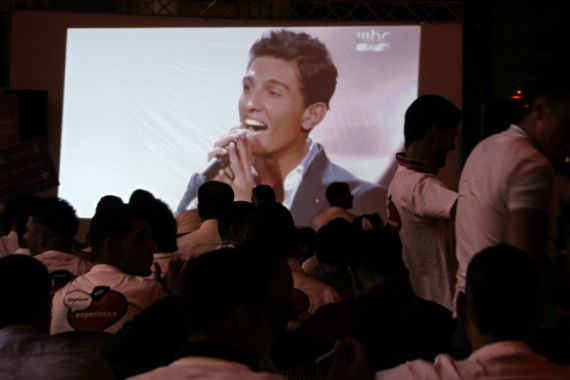For Palestine
Mohammad Assaf returns to Gaza, his Arab Idol success creating collective pride for all associated with Palestine.

For once, we won!
Mohammad Assaf, that brilliant, joyful, beautiful young man with a voice from heaven sang. And we all hung onto every note, every lyric, every smile and gesture he made on the stage of the Arab Idol contest over the past few months.
Keep reading
list of 4 itemsInside the pressures facing Quebec’s billion-dollar maple syrup industry
‘Accepted in both [worlds]’: Indonesia’s Chinese Muslims prepare for Eid
Photos: Mexico, US, Canada mesmerised by rare total solar eclipse
Born in a refugee camp, to those sturdy and steadfast salt-of-the-earth Palestinians, Assaf’s life, like most Palestinians in Gaza, was pockmarked by craters of Israeli bombs and littered with the rubble and bodies that Israel’s barbarity leaves in its perpetual warring wake. His life was hemmed in by an awful siege blocking one from entering or leaving Gaza.
Just reaching the Arab Idol auditions in Egypt was an ordeal. First the Egyptians wouldn’t let him out of Gaza. So he sang for the border officers, and his voice melted their resolve until they were men again, instead of soldiers, and let him pass at the last hour.
|
|
| Gazan becomes first Palestinian winner of Arab Idols |
When he reached the audition site, he was blocked by a wall and a gate through which only individuals who had registered earlier could pass. So he climbed the wall and jumped over that barrier. Then he couldn’t get into the building without an audition number. So he sang again and a fellow Palestinian contestant, moved by that voice, gave up his number for Assaf. He was the last contestant to audition and the judges had to wait a bit for him. They almost didn’t, and Assaf almost didn’t get his chance. History almost didn’t happen. Israel and the hypocrites who support Israel almost stole his brilliant destiny.
Only they couldn’t. His song was bigger and his resolve stronger. His person was more elegant and dignified. His lyrics were native and organic, written by the earth of Palestine, steadied by the roots and bones of our ancestors and watered with the spilled blood of our martyrs.
And when he stood on stage, his voice carried us all on his wings. All of us Palestinians – from Haifa and Nazareth, to Jerusalem and Ramallah and Hebron, to the refugee camps of Lebanon and Syria, to the diaspora in all parts of the world – found each other in his song. The geographic, political, social and psychological divides that Israel feeds dissolved, and for those moments of music, Palestine was free and we were one.
For the duration of his song, there were no more refugee camps, no more home demolitions or checkpoints, no segregated roads or segregated housing, no more bombs raining from the sky; there were no lost generations, no more need for impossible permits to travel one mile to see our loved ones. In his song, we could just walk into Jerusalem and pray. For those moments, we could imagine, and feel proud and hopeful.
And when he won the Arab Idol title, and he fell to his knees and bowed in humble prayer, the millions of us around the globe were lifted off our feet in joy and triumph, as if what we felt through his songs could be real and permanent.
|
When he won the Arab Idol title, and he fell to his knees and bowed in humble prayer, the millions of us around the globe were lifted off our feet in joy and triumph. |
Israel, of course, understood the hope and pride that stirred in us all. And just as Gaza was celebrating and dancing to the tune of pride, Israeli war planes roared in the sky, dropping bombs. I don’t know what excuse they gave for yet another murderous rampage. I didn’t bother reading their tired lies. But we know they are insecure, afraid of our roots and our pride. We know they cannot bear to see us happy and celebrating. That they cannot bear to see us at all in our own land, upon which they continue to squat and covet.
With poise and the smile we’ve all come to adore, Assaf paid tribute to his parents, siblings, and his country. His final song in the Arab Idol contest was a folk (Baladi) song made from the steadfastness of his long-suffering people, and it moved the whole of the Arab world. It was a thing of beauty and Israel just couldn’t stand it.
Friends in Gaza said that they would continue dancing and singing through the bombs. Because this win is not just a contest accolade or a moment to feel good. Assaf himself is a metaphor and a living truth of who we are and what we can become. When interviewed after the announcement at Arab Idol, Assaf spoke of his resistance to Israeli aggression and colonisation of Palestine. He said, “a song or a paintbrush or a pen or an instrument are tools of resistance as powerful, if not more, than a rocket”.
Israel has labelled Assaf’s birthplace as a “den of terror”, where Palestinian mothers, they claim, do not love their children and send them to die by Israeli bullets for media attention. Through this hateful language and Israel’s imperialist aggression, this exquisite young man walked onto the world stage with such brilliance and with his loving parents cheering him on. What we can see clearly in his shadow is that Israel sits small and unrooted, with guns and steel but no authenticity and no native song.
Susan Abulhawa is a Palestinian thinker, essayist, and the author of the international bestselling novel, Mornings in Jenin (Bloomsbury 2010). She is also the founder of Playgrounds for Palestine, an NGO for children.
Follow her on Twitter: @sjabulhawa
